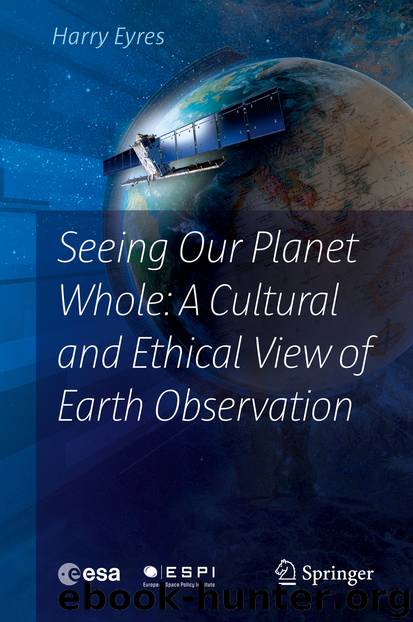Seeing Our Planet Whole: A Cultural and Ethical View of Earth Observation by Harry Eyres

Author:Harry Eyres
Language: eng
Format: epub
Publisher: Springer International Publishing, Cham
Hegel
At the beginning of his great treatise The Phenomenology of Spirit Hegel writes that “The significance of that ‘absolute’ commandment, ‘know thyself’…is not to promote mere self-knowledge in respect of the particular capacities, character, propensities, and foibles of the single self.”2 According to Frances Berenson, “Hegel writes that the Other Self is the only adequate mirror of my own self-conscious self; the subject can only see itself when what it sees is another self-consciousness.”3 But if Hegel acknowledges that the self can only be known in relation to the other, the example he gives of this process, the Master-Slave dialectic, does not seem particularly encouraging. In the first stage of this, according to Berenson, “each person only fully recognizes his own conscious being and belittles any claim to other self-consciousness. Here each self seeks to assert his own self-consciousness even at the price of destroying the life and self-consciousness of others, even though this risks his own existence.”4
In Hegel’s defence, we should acknowledge that this is only an early stage of the dialectic. Hegel does not propose the Master-Slave relationship as a satisfactory one. In a passage which has given rise to multiple interpretations, Hegel suggests that through the crucible of the unsatisfactory Master-Slave relationship a more rewarding one of mutual recognition and self-knowledge may be achieved.
Download
This site does not store any files on its server. We only index and link to content provided by other sites. Please contact the content providers to delete copyright contents if any and email us, we'll remove relevant links or contents immediately.
The Lonely City by Olivia Laing(4798)
Animal Frequency by Melissa Alvarez(4459)
All Creatures Great and Small by James Herriot(4311)
Walking by Henry David Thoreau(3952)
Exit West by Mohsin Hamid(3823)
Origin Story: A Big History of Everything by David Christian(3687)
COSMOS by Carl Sagan(3617)
How to Read Water: Clues and Patterns from Puddles to the Sea (Natural Navigation) by Tristan Gooley(3460)
Hedgerow by John Wright(3354)
How to Read Nature by Tristan Gooley(3335)
The Inner Life of Animals by Peter Wohlleben(3309)
How to Do Nothing by Jenny Odell(3293)
Project Animal Farm: An Accidental Journey into the Secret World of Farming and the Truth About Our Food by Sonia Faruqi(3212)
Origin Story by David Christian(3194)
Water by Ian Miller(3177)
A Forest Journey by John Perlin(3067)
The Plant Messiah by Carlos Magdalena(2926)
A Wilder Time by William E. Glassley(2858)
Forests: A Very Short Introduction by Jaboury Ghazoul(2836)
